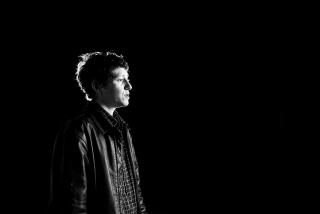MAKING MUSIC, LIZ STORY STYLE
- Share via
The pianist Liz Story, at 30, already has enjoyed more than three years of concert and recording success performing a type of music that she, along with a small cadre of Windham Hill recording artists, has helped define since the dawn of the ‘80s.
More or less officially, the music of her ilk is called New Age (less official is the name Yup-zak) and it is a genre in which swirl the waterfall piano melodies of George Winston, the gently lilting guitar of Alex de Grassi and the airy group sounds of Interior.
Story was there at the beginning when the music was called jazz, there a bit later when it was called impressionistic, and she is currently plying her trade under the New Age banner.
She has yet to find happiness with any of the names.
“It’s as inappropriate (a name) as jazz was for me,” Story said recently from her home in Prescott, Ariz. “What is ‘New Age’ anyway? Some awareness program? Do you only wear cotton?”
Given her druthers about labeling what she will be performing tonight at the Beverly Theatre on a bill with De Grassi, Story said, “I’d call it music.”
But she knows that people don’t go to music concerts. They go to jazz concerts and rock concerts and orchestral concerts--and as much as she dislikes the process, Story acknowledges the need for categorization, admitting that she has spent a lot of time trying to figure out what it is she plays.
“I would like to find a name for it, a meaningful word,” she said, recalling that when her music was called “impressionistic” it was because of the album’s cover art. “Naming things was once a very sacred thing; now it’s a marketing device.”
Story has fared well by the marketing device, though. Once a name uttered only as a qualifying adjective to “Windham Hill recording artist,” Story now thinks her records will be binned under her own name rather than her new label, RCA Novus.
“Leaving Windham Hill was like leaving a family,” she said, adding that it was the toughest decision of her young professional career. “They were really sweet and wonderful people and they gave me my career.
“But now I would like to be ‘Liz Story’ . . . have more of a chance to be myself.”
Story’s story is remarkably uneventful, her talent uninfluenced by fantastic events of disadvantage or despair.
“I know very little about myself,” Story said in recalling her life. “I grew up in L.A. and studied (piano) with private teachers and whatever teachers were in the schools. I went to Hunter College in New York City for about 1 1/2 semesters. Then I went to Dick Grove’s (School of Music in Studio City) for about 1 1/2 semesters.”
She was one of five children in a family whose father’s musical tastes ran from Hawaiian guitar music to German polkas.
“Everybody played instruments and we all had our own radios, bought our own records,” Story said. “I spent my baby-sitting money buying piano concerto records. I had one Sinatra album and one by Jobim that I bought because I liked the cover.
“I played a lot of Mozart and I didn’t listen to jazz until I was 20.”
When she did listen to jazz it offered a “revelation.”
“I heard Bill Evans at the Bottom Line in New York,” she recalled. “The place was only half-full and I couldn’t figure out why he wasn’t in Carnegie Hall. After his set I walked up to him, introduced myself and told him I wanted to study with him. He told me he didn’t really teach but that I should study with one of two people, Lennie Tristano or Sanford Gold. Then he said that I should study with Gold because everybody who studied with Tristano came out sounding like Tristano.
“The next day I quit Hunter College,” she said.
Story, who studied with Gold for eight months, also began listening to Joanne Brackeen, Richie Beirach and McCoy Tyner (“I didn’t understand what he was doing”) and absorbing their various approaches to improvisation.
“But jazz was a listening thing,” she cautioned, adding that her brand of improvisation is built into each piece she writes.
“I don’t write a song and play over the changes,” she said. “Folk, classical and pop songs are bigger parts of my music. I like Elton John and Joni Mitchell, their piano sounds.
“I’ve never thought of myself as a jazz player,” she said, “and when my first album got on the jazz charts, it got a lot of negative reaction (from jazz purists). But it got there by a process of elimination, I think. I certainly didn’t say it belonged there.
“It was like me calling you a blah-blah-blah and then your having to defend your being a blah-blah-blah when it has nothing whatsoever to do with you.”
On the road “six to eight months” a year, Story is anxious to slow the performing pace to spend time at her home she and her husband are building and to devote more time to writing.
“I write at the piano and I need to be home,” she said.
“Our property is bordered on two sides by a national forest and I like to hang out with the trees.”
More to Read
The biggest entertainment stories
Get our big stories about Hollywood, film, television, music, arts, culture and more right in your inbox as soon as they publish.
You may occasionally receive promotional content from the Los Angeles Times.










